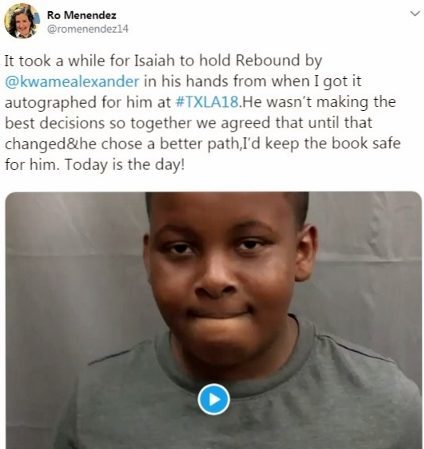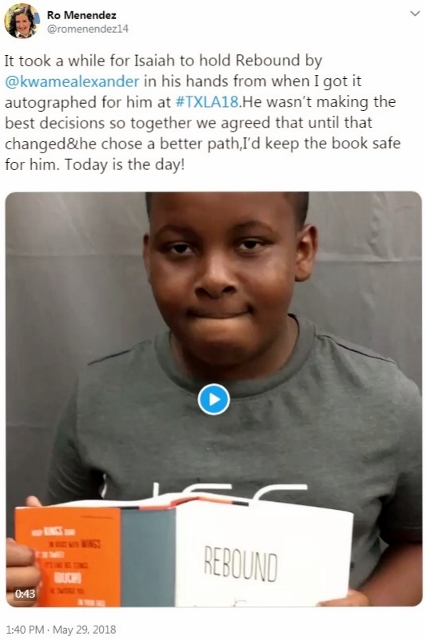
What if Educators Had Everything They Needed? Kyle Zimmer, First Book President, Co-founder, and CEO
By Kyle Zimmer, president, co-founder, and CEO of First Book. This post first appeared on Medium on June 12, 2018.
A Texas elementary school media specialist recently shared a 43-second video that blew me away. In the video, a young boy named Isaiah holds a book by award-winning author Kwame Alexander, and haltingly tries to find the right words to thank Kwame:
 “Your books, your words that you put in this book, your hard work—it really inspired me to do better in school…And you’re just a great author, because without you…I don’t think I would be in a good place, like where I am right now.”
“Your books, your words that you put in this book, your hard work—it really inspired me to do better in school…And you’re just a great author, because without you…I don’t think I would be in a good place, like where I am right now.”
I hear stories like this from educators every day. A teacher connects a child with a book – specially selected just for them – and their perspective changes. They think about their own futures in a whole new way.
But the truth is, far too many of our classrooms – especially those in the poorest neighborhoods where children need the most support – don’t have the books, school supplies, and basic educational resources that kids need to learn. This has enormous consequences. Researcher Susan Neuman of New York University reported nearly 20 years ago that access to adequate resources is one of the greatest contributors to literacy skills in the United States. Her research also revealed extensive “book deserts” that are concentrated in low-income communities across the U.S. – with one particularly impoverished D.C. neighborhood, for example, having only a single book to be shared among 830 children.
Just this past March, an independent review of Kansas state public schools tied increased education funding to improved academic outcomes. In another study, researchers from Northwestern University found that students in schools that experienced funding cuts posted lower test scores and were less likely to graduate from high school. “These patterns,” it noted, “suggest that (a) school spending cuts do matter, and that (b) the ill-effects of the recession on the affected youth (through reduced public school spending) will be felt for years.” Taken together, the studies underscore what educators have been telling us for years. Classrooms need relevant, high quality books and resources to fuel learning. Teachers have seen what happens in classrooms when resources are diminished; now the research is finally catching up to them.
For years, teachers have been reaching into their own pockets to fill the chasm of need that they see every day. The U.S. Department of Education reported that educators spend an average of nearly $500 every year out of their own money on books and supplies without reimbursement; many spend much more. It also reported that educators at low-income schools are outspending their counterparts in higher-income neighborhoods, with the result that the most under-resourced educators are doing the most to make up for the need– even though they have the least to spare.
“If this country is going to close the achievement gap, a real thing that needs to happen is to have equitable access to rigorous materials…Not only do these kids not have access to these materials…but teachers don’t either.”–Minneapolis-St. Paul-based teacher
Those are not the words of a politician or policy maker; they are from a teacher in Minneapolis-St. Paul. She echoes what teachers across the country are saying: Our education system is at a breaking point.
First Book, the nonprofit social enterprise that I lead, makes brand-new books and resources available at the lowest possible cost, if not free, for the educators and kids who need them the most. We do so with the support of dedicated funders: from corporations that know the importance of investing in their future workforce to individuals who want to see more kids like Isaiah.
Isaiah was inspired by one book. Just imagine how many children’s lives could be truly transformed with an entire country of fully-resourced schools and educators.
